人教版小学英语六年级下册时态专项
六年级下册英语-小升初总复习-时态全解-人教版PEP(共29张PPT)
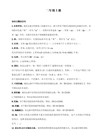
将来时理论
一、 概念:表示将要发生的动作或存在的状态及打算、 计划或准备做某事。 句中一般有以下时间状语: tomorrow, next day(week, month, year…),
soon, the day after tomorrow(后天) this morning , this afternoon , this evening等。
试题演练:
三、 选择正确的答案。 B presents for my parents yesterday. 1. I ____ A. buyed B. bought C. buying C 2. Susan _____ swimming yesterday. A. go B. goes C. went B 3. Danny _____ breakfast five times last week. A. eat B. ate C. eated C Tree Planting Day. 4. Last Sunday____ A. is B. were C. was
试题演练:
一、写出下列动词的过去式或动词原形。 went was 1. go_______ 2. is___________ Lorem ipsum dolor bought 3.buy_______ 5. have had ____
sit amet, consectetur adipisicing elit, sed do eiusmod tempor incididunt ut labore
swam 4.swim__________
6. watched watch _____
eat 7. ate______
get 8. got__________
人教版六年级英语下册时态专项练习卷(含答案)
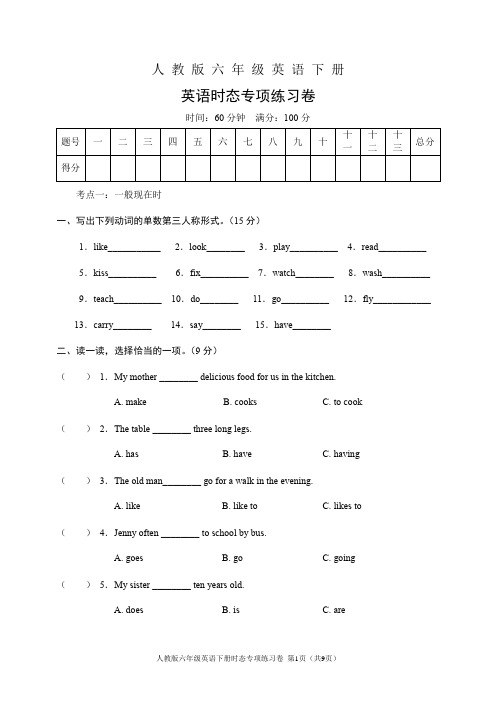
人教版六年级英语下册英语时态专项练习卷时间:60分钟满分:100分考点一:一般现在时一、写出下列动词的单数第三人称形式。
(15分)1.like___________ 2.look________ 3.play__________ 4.read__________ 5.kiss__________ 6.fix__________ 7.watch________ 8.wash__________ 9.teach__________ 10.do________ 11.go__________ 12.fly____________ 13.carry________ 14.say________ 15.have________二、读一读,选择恰当的一项。
(9分)()1.My mother ________ delicious food for us in the kitchen.A. makeB. cooksC. to cook()2.The table ________ three long legs.A. hasB. haveC. having()3.The old man________ go for a walk in the evening.A. likeB. like toC. likes to()4.Jenny often ________ to school by bus.A. goesB. goC. going()5.My sister ________ ten years old.A. doesB. isC. are()6.________ he play football for fun on Sundays?A. IsB. DoC. Does()7.The child________ go to the zoo.A. doesn'tB. don'tC. is()8.The sun ________ in the east every day.A. riseB. risesC. rising()9.He________his teeth, ________ his face and then ________ breakfast.A. brush; wash; haveB. brushes; washes; haveC. brushes; washes; has三、按要求完成下列句子。
2024年人教pep版六年级下册英语小升初复习题型分类训练——时态二:现在进行时

小升初题型分类评价时态二:现在进行时时间:20 分钟满分:60 分一、[安徽省滁州市] 用所给词的适当形式填空。
(15 分)1. The boy (draw) a picture now.2. Listen! Some girls (sing) in the classroom.3. —(be) Helen (wash) the clothes?—Yes, she is.4. What (be) you (do) now?5. They (not water) the flowers now.二、[安徽省蚌埠市] 单项选择。
(15 分)( ) 1. —you playing basketball now?—No, we .A. Are; aren'tB. Are; don'tC. Do; don't( ) 2. It's eight o'clock. The students an English class.A. haveB. havingC. are having( ) 3. Don't talk here. Your grandparents .A. is sleepingB. are sleepingC. sleeping( ) 4. I for my friends now.A. will waitB. am waitingC. waited( ) 5. —she her homework? — No, she isn't.A. Is; doingB. Does; doC. Is; do三、[湖北省黄冈市] 连词成句。
(15 分)1. books, down, the, are, stairs, the, falling (.)2. riding, my, bike, is, sister, now, a (.)3. the, elephant, water, is, drinking (.)4. going, are, they, fishing, in, park, the (.)5. I, feeling, not, well, am (.)四、按要求完成句子。
人教版(PEP)六年级下册英语四种时态复习

人教版六年级英语四种时态复习四种时态复习一般现在时的基本概念一般现在时表示现在经常反复发生的动作、存在的状态或习惯性的动作的时态。
常见的标志词(时间状语)主要有:every…, sometimes, at…, on Sundays, uauslly often, never, always等。
一般现在时的结构be动词的一般现在时主语+ Be动词+ 其他成分I am a boy.实义动词的一般现在时主语+ 行为动词+ 其他成分We study English.一般现在时的具体形式be动词的一般现在时1.第一人称单数I+amI am a student.2. 第二人称单数you和其他人称复数we/you/they+areYou are a lucky girl.We are students in this school.3. 第三人称单数he/she/it+isShe is my teacher.例题:用be动词的适当形式填空。
1. I from China.2. It very hot today.3. They in the hospital.4. We good students.5. She a beautiful girl.实义动词的一般现在时1.第一、二人称单数I/you和其他人称复数we/you/they+动词原形I get up at 8 o’clock.They go to school everyday.2.第三人称单数he/she/it+实义动词第三人称单数形式It runs fast.He studies hard.例题:用说给单词的适当形式填空。
1. We home every day.(go)2. Trees green in spring.(turn)3. He very hard.(study)4. The boy up at seven O'clock.(get)5. The earth round the sun.(move)补充:主语为第三人称单数形式,谓语动词的变化规则:一般现在时的句型变化be动词的一般现在时肯定句否定句He is a worker. 主语+ be动词+ not + 其他He is not a worker.一般疑问句特殊疑问句Be动词+ 主语+ 其他特殊疑问词+ 一般疑问句-Is he a worker?Where is he?-Yes, he is. / No, he is not.例题:写出下列句子中所缺的be动词,并用肯定及否定形式回答。
小学英语六年级所有时态综合练习
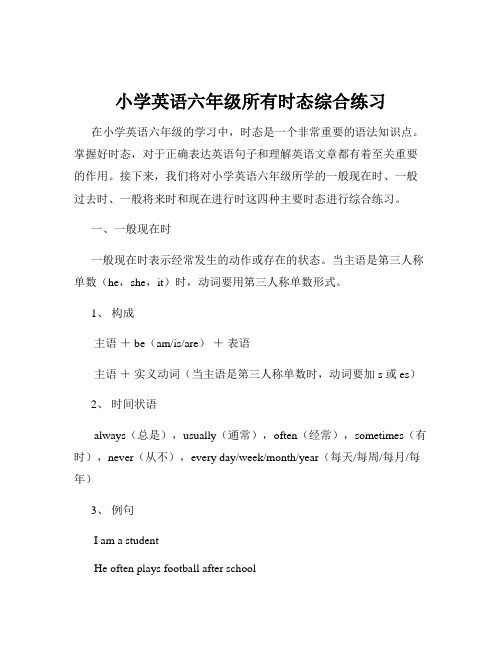
小学英语六年级所有时态综合练习在小学英语六年级的学习中,时态是一个非常重要的语法知识点。
掌握好时态,对于正确表达英语句子和理解英语文章都有着至关重要的作用。
接下来,我们将对小学英语六年级所学的一般现在时、一般过去时、一般将来时和现在进行时这四种主要时态进行综合练习。
一、一般现在时一般现在时表示经常发生的动作或存在的状态。
当主语是第三人称单数(he,she,it)时,动词要用第三人称单数形式。
1、构成主语+ be(am/is/are)+表语主语+实义动词(当主语是第三人称单数时,动词要加 s 或 es)2、时间状语always(总是),usually(通常),often(经常),sometimes(有时),never(从不),every day/week/month/year(每天/每周/每月/每年)3、例句I am a studentHe often plays football after schoolThey are very happy练习:1、 My father ______ (watch) TV every night2、 She ______ (like) music very much3、 The children often ______ (play) in the park二、一般过去时一般过去时表示过去发生的动作或存在的状态。
1、构成主语+ was/were +表语主语+动词的过去式2、时间状语yesterday(昨天),last week/month/year(上周/上个月/去年),ago(以前),in +过去的年份3、例句I was at home yesterdayThey played basketball last weekHe went to Beijing two years ago练习:1、 We ______ (have) a party last night2、 She ______ (buy) a new dress yesterday3、 He ______ (do) his homework an hour ago三、一般将来时一般将来时表示将来要发生的动作或存在的状态。
小学六年级英语四大时态总复习练习

小学六年级英语四大时态总复习(Xi)练习一提到时态,就必然用到动词。
首先要明确两(Liang)个概念:动词有五种形式,即:原形(形式),第三人称单数(形式),过(Guo)去式(形式),现在分词(形式),过去分词(形式)。
小学阶段,句子有以下四种常见时态(Tai),即:一(Yi)般现在时态;一般过去时态;一般将来时态;现在进行时态。
式(Shi),意思就是各种不同的形式,是对应着动(Dong)词来说的;时(Shi)态,意思就是表达各种不同的时间的事情,是对应着句子来说的。
式与时,先搞懂区别。
一、一般现在时态一般现在时用法口诀一般现在时,every, usually, often, sometimes.第一、二人称和复数,动词原形不变换。
除了I, you,复数外,动词后加s(es)别忘怀。
要变一般疑问句,be动词提前很容易。
若是没有be动词,Do和Does开头要注意。
否定句,很简单,not 在be 动词后面站。
若是没有be动词,do, does加not 要牢记。
请把这些规律记,一般现在时没问题。
一般现在时态,可能是两种意思。
第一,表示经常性的动作,常与often, sometimes, usually, every day, everyweek, every month, every year等表示频率的副词连用。
例如:He often goes swimming in summer.I usually go to work by bike.Sam visits China every year.第二,表示现在的状态。
如:My mother is a worker.注意问(Wen)题:be (am, is, are) 动词就是独立(Li)的谓语动词,一个句子中有了be(am, is, are) 就有(You)了谓语动词了。
句子(Zi)中不能同时出现两个谓语(Yu)动词。
不少同学经常出这样的错(Cuo)误:The boy is often eats hamburgers.(错(Cuo))应改(Gai)为: The boy often eats hamburgers.二、现在进行时态正在进行时态口诀现在分词用途多,进行时态不用说。
(完整版)小学六年级英语时态练习题【完整版】

英语时态练习题Ⅰ用适当形式填空.1. He __________ back a month ago. (come)2. My mother often tells me __________ in bed. (not read)3. I must take it back the day after tomorrow. You can only __________ it for 24 hours. (keep)4. Why have you kept me __________ here for so long a time? (wait)5. Please come to our meeting if you __________ free tomorrow. (be)6. She __________ to the Great Wall several times. (go)7. In his letter, he said that he __________ us very much. (miss)8. The film __________ for nearly fifteen minutes when I got to the cinema. (be)9. He said he became __________ in physics. (interest)10. This film is worth __________. (see)11. He went to school instead of __________ home. (go)12. In the old days it was difficult for the poor to __________ a job. ( find)13. It's cold outside, so you'd better __________ your coat. (put on)14. He is hungry. Please give him something __________. (eat)15. Please don't waste time __________ TV every evening. You should word hard at English. (watch)16. We found the window __________. (break)17. You have dropped your pencil. __________. (拾起它)18. Mother often tells me __________ too late. (not come home)19. You had better __________ by bus, or you will be late. (go)20. I will __________ Li Ming the good news as soon as I see him.( tell)21. Great changes __________ in our country since 1978. (take place)22. I __________ my daughter since last month. (hear from)23. It __________ me two days to write the article. (took)24. Don't touch that __________ child. (sleep)25. Every time he tried to start the car, the wheels __________ deepersintosthe mud. (sink)26. When I got home, I found that my room __________ breaksintosand a lot of things __________. (steal)27. If I had arrived there earlier, I __________ him. (meet)28. I didn't remember __________ her the book before. (give)29. He called at every door, __________ people the exciting news. (tell)30. Yesterday Mary couldn't finish her homework, so she has to go on __________ it this afternoon. (do)31. We __________ football when it began to rain. We had to stop and go home. (play)32. Xiao Lin __________ from here for about two hours. (be away)33.swheres__________? Can you find your birth place on the map? Sorry, I can't. (be born)34. Last night we __________ back home until the teacher left school. (not go)35. Comrade Li Dazhao __________ in prison in 1927. (put)36. Where is professor Lee? He __________ to the library. He'll come back soon. (go)37. We could not help __________ after we heard the story. (laugh)38. Would you please __________ me an English-Chinese dictionary when you come? (bring)39. He told me that he __________ the Great Wall the year before. (visit)40. I'll tell him the news as soon as he __________ back. (come)41. The boy __________ by the door is my brother. (stand)42. Do you remember __________ the film last year? (see)43. There __________ a physics test next Monday. (be)44. __________ I finish my homework in class? (必须) No, you needn't.45. I'm sorry you've missed the last bus. It __________ ten minutes ago. (leave)46. Wei Fang is heard __________ English every morning. (hear)47. John stopped __________ a rest (have) because he __________ for three hours. (work)48. I'm sorry to have kept you __________. (wait)49. A new theatre __________ now. (build)50. The boys __________ basketball on the playground are my classmates. (play)51. I regretted answering like that, I was sorry __________ so. (do)52. Can't you see I'm busy __________? (cook)53. He __________ worried when coming into the teacher's office. (look)54. __________ come beef! (随便吃点)55. It's a great shame for me __________ in front of so many people. (laugh at)56.Look!That man_(open)the door of your car.57.T.he moon_ (go)round the earth.58.I must go now.It_ (get)late.59.Let's go out.It_ (not/rain)now.60.Julia is vera good at languages.She_ (speak)four languages very well.61.Hurry up!Everybody_ (wait)for you.62."_ (you/listen)to the radio?”"No,you can turn it off.”63."_ (you/listen)to the radio?”"No,just occasionally.64.We usually_ (grow)vegetables in our garend but this year we_(not/grow)any.65.Ron is in London at the moment.He _ (stay)at the Park Hotel.He _ (always/stay)there when he's in London.66.Can we stop walking soon?I_ (feel)tired.67.Can you drive I_ (learn).My father_ (teach)me.ually I (finish)work at 5:00,but this week I (work)until 6:00to earn a bit more money.69.My parents_ (live)in Bristol.They were bron there and have never lived anywhere else.Where_ (your parents/live)?70.Sonia_ (look)for a place to live.She (stay)with her sister until she finds somewhere.71."What_ (your father/do)?”"He's an engineer but I_(not/enjoy)this one very much.Ⅱ.选择题.72 According to the time table, the train for London ___ at seven o'clock in the evening.A. was leavingB. has leftC. leavesD. will leave73 You should visit this part of the country when ___A. spring will comB. spring comesC. It has been springD. It will be spring74 You needn't hurry her. She ___ it by the time you are ready.A. will have been finishingB. Would finishC. Will have finishedD. Will be finishing75. We can go home when the ground ___A. is dryingB. has driedC. driedD. will dry76. Obviously, he ___ a bad cold. He sneezes so often.A. hasB. has beenC. hadD. was77. Darwin proved that natural selection ___the chief factor in the development of species.A. has beenB. had beenC. isD. was78. While Peggy ___, her brother is playing records.A. readsB. is readingC. has read D has been reading79. It's been a long time since I ___. How are you?A. had last seen youB. saw you lastC. have least seen youD. last was seeing you80. We ___ on it for several hours but we have not yet reached any conclusion.A. workB. are workingC. have been workingD. have been worked81. He said that he ___ for Shanghai the next day.A. will leaveB. has leftC. would leaveD. had left82. This is the first time I ___ this kind of refrigerator.A. sawB. have seenC. am seeingD. see83. "As soon as I ___ home, I'll have a hot bath." He promised himself.A. gotB. will getC. have gotD. am getting84. —_____ my glasses? —Yes, I saw them on your desk a minute ago.A. Do you seeB. Have you seenC. Had you seenD. Would you see85. —Who is Clarke? —_____ him yet? I saw you shaking hands with him at the meeting.A. Haven’t you metB. Hadn’t you metC. Didn’t you meetD. Don’t you meet86. I think this time yesterday he ___ an English class in No. Three Classroom BuildingA. hadB. will haveC. was havingD. would have87. By 2000, the university ___ 20,000 postgraduates.A. will be trainedB. trainsC. will have trainedD. would have88. I will ask her for the book now, for she ____ plenty of time to read sinceI lent it to her.A. hasB. has hadC. had hadD. was having89. Our football team _____ every match so far this year, but we still have three more games to play.A. winsB. was winningC. had wonD. has won90. —Who sings best in your class? —Mary _____.A. isB. doesC. doD. sing91. She _____ her pen in her room now.A. findsB. is findingC. looks forD. is looking for92. I first met Lisa three years ago. She _____ at a radio shop at that time.A. has workedB. was workingC. had been workingD. had worked93. What _____ you _____ tomorrow morning?A. are/going to doB. are/doingC. are/doneD. have/done94. I _____ as soon as you come back.A. wentB. have goneC. am goingD. shall go95. The scientist _____ Canada and he will give us a talk when he _____ back.A. has gone to/comesB. has been to/will comeC. has gone to/will comeD. has been to/comes96. He found his book this morning, but now he _____ his pen.A. losesB. is missingC. has lostD. lost97. She ___¬_ to her hometown several times.A. has beenB. has goneC. wentD. is going98. It _____ Jane and Mary who helped me the other day.A. isB. wasC. areD. were99. I _____ to bed when the telephone rang.A. have beenB. wentC. am goingD. was going100. Jane _____ some washing this time yesterday.A. is doingB. had doneC. was doingD. did三、根据意思,填入所缺的单词。
人教版小学六年级英语各时态结构总结及练习题(cy)
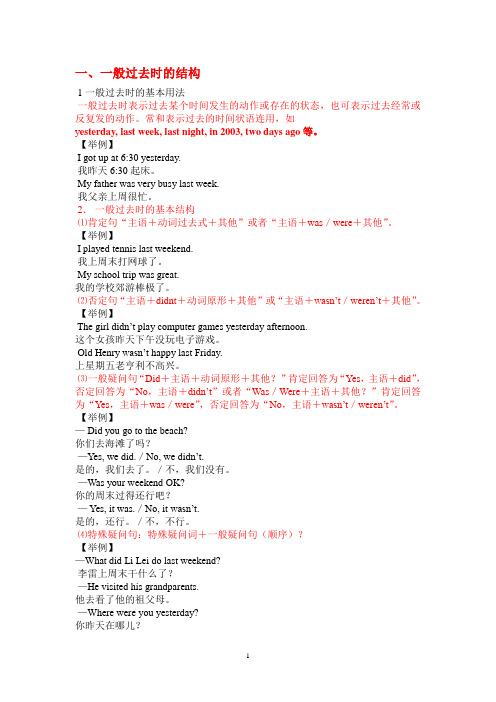
一、一般过去时的结构1一般过去时的基本用法一般过去时表示过去某个时间发生的动作或存在的状态,也可表示过去经常或反复发的动作。
常和表示过去的时间状语连用,如y esterday, last week, last night, in 2003, two days ago等。
【举例】I got up at 6:30 yesterday.我昨天6:30起床。
My father was very busy last week.我父亲上周很忙。
2.一般过去时的基本结构⑴肯定句“主语+动词过去式+其他”或者“主语+was/were+其他”。
【举例】I played tennis last weekend.我上周末打网球了。
My school trip was great.我的学校郊游棒极了。
⑵否定句“主语+didnt+动词原形+其他”或“主语+wasn’t/were n’t+其他”。
【举例】The girl didn’t play computer games yesterday afternoon.这个女孩昨天下午没玩电子游戏。
Old Henry wasn’t happy last Friday.上星期五老亨利不高兴。
⑶一般疑问句“Did+主语+动词原形+其他?”肯定回答为“Yes,主语+did”,否定回答为“No,主语+didn’t”或者“Was/Were+主语+其他?”肯定回答为“Yes,主语+was/were”,否定回答为“No,主语+wasn’t/were n’t”。
【举例】— Did you go to the beach?你们去海滩了吗?—Yes, we did./No, we did n’t.是的,我们去了。
/不,我们没有。
—Was your weekend OK?你的周末过得还行吧?— Yes, it was./No, it wasn’t.是的,还行。
/不,不行。
⑷特殊疑问句:特殊疑问词+一般疑问句(顺序)?【举例】—What did Li Lei do last weekend?李雷上周末干什么了?—He visited his grandparents.他去看了他的祖父母。
小学六年级英语时态练习题
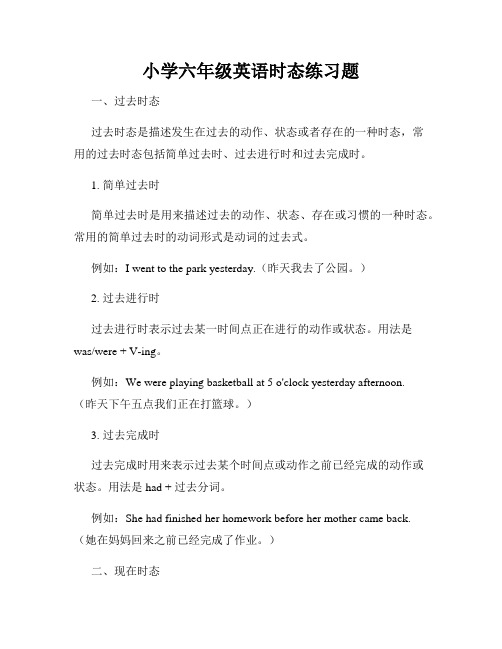
小学六年级英语时态练习题一、过去时态过去时态是描述发生在过去的动作、状态或者存在的一种时态,常用的过去时态包括简单过去时、过去进行时和过去完成时。
1. 简单过去时简单过去时是用来描述过去的动作、状态、存在或习惯的一种时态。
常用的简单过去时的动词形式是动词的过去式。
例如:I went to the park yesterday.(昨天我去了公园。
)2. 过去进行时过去进行时表示过去某一时间点正在进行的动作或状态。
用法是was/were + V-ing。
例如:We were playing basketball at 5 o'clock yesterday afternoon.(昨天下午五点我们正在打篮球。
)3. 过去完成时过去完成时用来表示过去某个时间点或动作之前已经完成的动作或状态。
用法是had + 过去分词。
例如:She had finished her homework before her mother came back.(她在妈妈回来之前已经完成了作业。
)二、现在时态现在时态是描述现在发生的动作、状态或者存在的一种时态,常用的现在时态包括简单现在时、现在进行时和现在完成时。
1. 简单现在时简单现在时用于表示客观事实、经常性的动作或状态。
常用的动词形式是原形动词。
例如:We usually go to school by bus.(我们通常乘公交车去学校。
)2. 现在进行时现在进行时用来表示现在正在进行的动作。
用法是am/is/are + V-ing。
例如:They are watching TV now.(他们现在正在看电视。
)3. 现在完成时现在完成时表示过去某个时间点开始的动作一直延续到现在,或者与现在的动作或状态有关。
用法是have/has + 过去分词。
例如:I have lived in this city for 10 years.(我在这个城市已经住了十年了。
)三、将来时态将来时态是描述将来发生的动作、状态或者存在的一种时态,常用的将来时态包括简单将来时、将来进行时和将来完成时。
人教版小学六年级下册重点时态复习要点

小学六年级重点时态复习要点1.一般将来时态(1)表示计划或打算做某事。
(2)句子组成结构主语+be going to +动词原形+将来时间或者主语+ will +动词原形例句: I am going to see a film tomorrow. 或 I will see a film tomorrow.He is going to take a trip next week. 或 He will take a trip They are going to play football next Saturday. 或 They will play football next Saturday.(3)记住表示将来的时间单词 tomorrow 明天 next week 下周 next weekend下周末 this morning 今天上午 this afternoon今天下午this evening今天晚上 the day after tomorrow 后天 next year 明年next Monday下周一(星期单词还有Tuesday周二 Wednesday周三 Thursday周四 Friday 周五Saturday周六 Sunday周日)next month下个月 next January明年一月(月份单词还有 February 二月March 三月 April四月 May 五月 June六月 July七月 August八月 September九月October 十月November 十一月 December十二月 ) tonight今晚(3)将来时态的一般疑问句和肯定、否定回答。
第一组Are you going to see a film tomorrow?肯定回答 Yes,I am. 否定回答No, I am not.第二组Is he going to take a trip next week?肯定回答Yes ,he is. 否定回答No, he isn’t.第三组Are they going to play football next Saturday?肯定回答Yes, they are. 否定回答No, they aren’t.第四组Is Mike going to read a book?肯定回答Yes,he is. 否定回答No,he isn,t.第五组Will he go to the book store tomorrow?肯定回答Yes, he will. 否定回答No he won’t(4)一般将来时常见的问答对话(黑颜色的为问句,红颜色为答语)What are you going to do tomorrow?你打算明天去做什么?I am going to visit my grandparents tomorrow.我明天打算去拜访外祖父母?Where are you going next week?你下周打算去哪里?I am going to the library next week.我打算下周去图书馆。
人教版六年级下册知识点归纳动词时态与语态

人教版六年级下册知识点归纳动词时态与语态人教版六年级下册知识点归纳-动词时态与语态动词时态和语态是语法中的重要概念,对于学生来说也是一个较为复杂的知识点。
在人教版六年级下册的英语教材中,这个知识点得到了相应的归纳和总结。
本文将根据人教版六年级下册英语教材,对动词时态与语态进行梳理和归纳。
一、一般现在时一般现在时表示经常性或者习惯性的动作,也可以用来表达客观真理和普遍事实。
其结构是“主语+动词原形”。
例如:1. She often plays basketball with her friends.2. He doesn't like eating vegetables.3. Do you usually go to school by bus?二、一般过去时一般过去时表示过去某个时间发生的动作或者发生的频率较低的动作。
其结构是“主语+动词过去式”。
例如:1. I watched a movie yesterday.2. They visited their grandparents last weekend.3. Did you finish your homework?三、一般将来时一般将来时表示将来某个时间要发生的动作或者事件。
其结构是“主语+will+动词原形”。
例如:1. We will have a picnic next Sunday.2. She will go to Beijing next month.3. Will you go to the party with us?四、现在进行时现在进行时表示现阶段正在进行的动作,强调动作正在进行中。
其结构是“主语+be动词+动词ing形式”。
例如:1. I am playing football in the park.2. He is reading a book in the library.3. Are you watching TV now?五、过去进行时过去进行时表示过去某个时间正在进行的动作,也可以表示过去某个时间周围正在进行的动作。
人教版小学六年级英语时态练习题
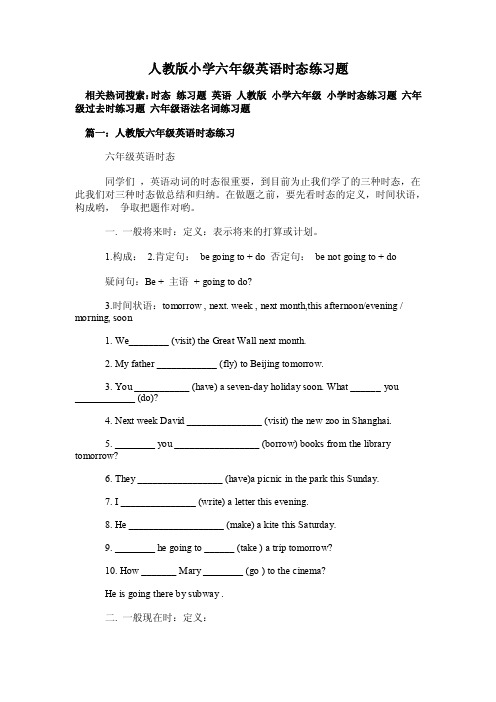
人教版小学六年级英语时态练习题相关热词搜索:时态练习题英语人教版小学六年级小学时态练习题六年级过去时练习题六年级语法名词练习题篇一:人教版六年级英语时态练习六年级英语时态同学们,英语动词的时态很重要,到目前为止我们学了的三种时态,在此我们对三种时态做总结和归纳。
在做题之前,要先看时态的定义,时间状语,构成哟,争取把题作对哟。
一. 一般将来时:定义:表示将来的打算或计划。
1.构成:2.肯定句:be going to + do 否定句:be not going to + do疑问句:Be + 主语+ going to do?3.时间状语:tomorrow , next. week , next month,this afternoon/evening / morning, soon1. We________ (visit) the Great Wall next month.2. My father ____________ (fly) to Beijing tomorrow.3. You ___________ (have) a seven-day holiday soon. What ______ you____________ (do)?4. Next week David _______________ (visit) the new zoo in Shanghai.5. ________ you _________________ (borrow) books from the library tomorrow?6. They _________________ (have)a picnic in the park this Sunday.7. I _______________ (write) a letter this evening.8. He ___________________ (make) a kite this Saturday.9. ________ he going to ______ (take ) a trip tomorrow?10. How _______ Mary ________ (go ) to the cinema?He is going there by subway .二. 一般现在时:定义:1. 经常性或习惯性的动作。
小学英语时态总复习(课件)度人教版PEP版英语六年级下册
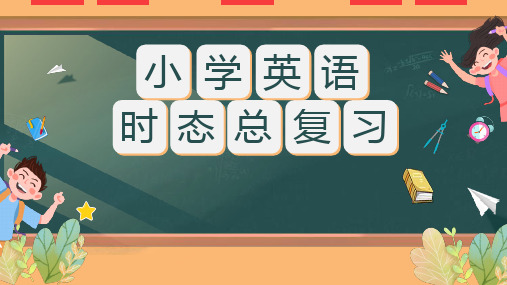
When did you clean the classroom?
yesterday
给对应的时态找到时间伙伴
用动词的正确形式填空 1. she __d_o_e_s_ (do) her homework every evening. 2. We ___f_l_y__ (fly) kites in the park on Sundays. 3. My mother __c_le_a_n_e_d_ (clean) our room last Sunday. 4. Tom __p__la_y_s_(play) the piano every Saturday. Now he_i_s_p_la_y_ing(play). 5. She __l_ik_e_s__(like) swimming. She i_s g_o_in_g_to__sw_im_(swim) next weekend. 6. Usually my mother _w_a_s_h_e_s_ (wash) the dishes after lunch. But my grandma_w_a_s_h_e_d_ (wash) yesterday. 7. Look at the man! He __is_r_e_a_d_i_n_g__ (read) a magazine. 8. _D__id_ (do)you__d_o(do)homework last weekend?
习惯性的 动作
爱好
Tip
经常发生
现在进行时态 表示正在发生的动作, 常与表示现在的时间 now, listen, look 连用
结构:
问:What+be动词+主语+doing? 答:主语+be动词+动词ing形式。 如:——What are you doing?
时态(讲义)-人教PEP版英语六年级下册2

小升初专练三:时态专练(二)【现在完成时】一.基本结构have(has) + been + done(动词的现在分词)否定句式have(has) + not + been + done(动词的现在分词) 疑问句式have(has)放在句首二.用法1. 过去发生的动作对现在有影响I have seen the film ,so I know what the story says.2.过去发生的动作持续到现在(还有可能继续发生)The film has been on for 5 minutes.三.延续性动词1. 现在完成时中应使用延续性动词2. 非延续性动词:动作开始既(即)结束四.标志语1.already(已经)2.ever(曾经)3.yet(还,已经)4.just(刚刚)5.ever (曾经)6.before(在……之前)7.since(自从)8.so far(到目前为止)【练一练】1. The Whites many places of interest since they came to China.A. have visitedB. will visitC.visitedD.visit2. How many English books since last year?A. did you readB. have you readC. had you read3.How long have you the book?—For three weeks.A. hadB. keepC. buyD. bought4.you any books?Yes, I them two weeks ago.A. Have: bought; have boughtC. Have, bought; boughtB. Did; buy: boughtD. Did: buy; have bought5. Which place you?A. have; beenB. have: been toC. have: goneD. have; gone to6.I at this school for about two months.A.amB. will beC. have beenD.was7.Have you got any picture books?A. Yes, I have.B. Yes. l don't.C. Yes, I got.8. I've lots of stamps.A. getB. getsC.got二、适当形式填空1. My father isn't here. Maybe he(go) to the supermarket.2. How long you(live) in this town?3. I have(understand).4. He(collect)300 pictures since 5 years ago.5. I have got a letter from my friend and he(get) a present from his friend.6.I (learn) English for three years.7.he(finish) his homework yet?Yes, he(do) it an hour ago.三、句型转换1.Sally has already put her name tag on the suitcase.(改为否定句) Sally put her name tag on the suitcase.2.Jack has watched TV for more than 3 hours.(改成否走句) Jack TV for more than 3 hours?3.I have got two hundred stamps.(对画线部分提问)stamps you got?4.John has done his homework for 4 hours.(改为一般疑问句)John his homework for 4 hours?5.The boy has been to Italy twice.(对划线部分提问)How has the boy been to Italy?。
时态(讲义)人教PEP版英语六年级下册
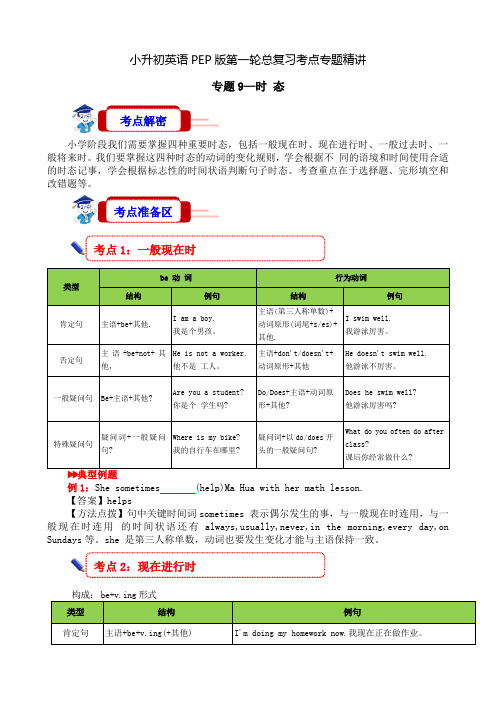
小升初英语PEP 版第一轮总复习考点专题精讲专题9—时 态 小学阶段我们需要掌握四种重要时态,包括一般现在时、现在进行时、一般过去时、一般将来时。
我们要掌握这四种时态的动词的变化规则,学会根据不 同的语境和时间使用合适的时态记事,学会根据标志性的时间状语判断句子时态。
考查重点在于选择题、完形填空和改错题等。
类型be 动 词行为动词 结构 例句 结构例句 肯定句 主语+be+其他. I am a boy. 我是个男孩。
主语(第三人称单数)+动词原形(词尾+s/es)+其他. I swim well. 我游泳厉害。
否定句 主语+be+not+其他, He is not a worker. 他不是 工人。
主语+don't/doesn't+动词原形+其他 He doesn't swim well.他游泳不厉害。
一般疑问句 Be+主语+其他? Are you a student? 你是个 学生吗? Do/Does+主语+动词原形+其他? Does he swim well?他游泳厉害吗?特殊疑问句 疑问词+一般疑问句? Where is my bike? 我的自行车在哪里? 疑问词+以do/does 开头的一般疑问句?What do you often do afterclass?课后你经常做什么? ▶▶典型例题例1:She sometimes (help)Ma Hua with her math lesson.【答案】helps【方法点拨】句中关键时间词sometimes 表示偶尔发生的事,与一般现在时连用,与一般现在时连用 的时间状语还有always,usually,never,in the morning,every day,on Sundays 等。
she 是第三人称单数,动词也要发生变化才能与主语保持一致。
构成: be+v.ing 形式类型结构 例句 肯定句 主语+be+v.ing(+其他) I'm doing my homework now.我现在正在做作业。
小学六年级英语时态练习题及答案

小学六年级英语时态练习题及答案一、时态概念回顾在学习英语时态之前,我们首先需要了解时态的概念。
时态指的是动词表示的动作或状态发生的时间。
英语中常用的时态有以下几种:一般现在时、一般过去时和一般将来时。
在学习英语时态时,我们需要掌握每种时态的基本用法和表示的时间。
二、一般现在时练习题1. 选择正确的动词形式填空。
1.He ______ (go/goes) to school every day.2.My sister ______ (likes/like) playing basketball.3.They ______ (watch/watches) TV in the evening.4.The train ______ (arrive/arrives) at 6 o’clock.5.I ______ (play/plays) the piano on weekends.2. 根据句子的意思,选择正确的答案。
1.______ your parents work in a factory? (Does/Do)2.We ______ basketball after school. (plays/play)3.Tom ______ a sandwich for lunch. (eat/eats)4.______ your brother like swimming? (Does/Do)5.My teacher ______ English very well. (teach/teaches)答案:1.goes2.likes3.watch4.arrives5.play6.Do7.play8.eats9.Does10.teaches三、一般过去时练习题1. 选择动词的适当形式填空。
1.He ______ (go/went) to the park yesterday.2.They ______ (watch/watched) a movie last night.3.She ______ (visit/visited) her grandparents on the weekend.4.We ______ (play/played) football yesterday.5.The cat ______ (catch/caught) a mouse just now.2. 根据句子的意思,选择正确的答案。
- 1、下载文档前请自行甄别文档内容的完整性,平台不提供额外的编辑、内容补充、找答案等附加服务。
- 2、"仅部分预览"的文档,不可在线预览部分如存在完整性等问题,可反馈申请退款(可完整预览的文档不适用该条件!)。
- 3、如文档侵犯您的权益,请联系客服反馈,我们会尽快为您处理(人工客服工作时间:9:00-18:30)。
( A )7. It's ten o'clock. Mum________ in the kitchen.
A. is working B. work C. worked
( B )8. Mother ________ me a nice present on my next
birthday.
A. give
A. tell
B. like
C. to tell
( B )5. We ________horses last weekend.
A. ride
B. rode
C. rided
( A )6. I want ________them.
A. to go with B. to going with C. help
_I_a_m__w__a_te_r_in_g__th_e__tr_e_e_s________. 2. Where are you going to travel?
_W_e__a_re__g_o_in_g__to__tr_a_v_e_l _to__B_e_ij_i_n_g_.
3. What does Sam often do on Sunday night? _H_e_o_f_t_en__d_o_e_s_h_o_u_s_e_w_o_r_k_o_n__S_u_n_d_a_y_n_i_g_h_t .
( A )4. Yesterday I play football with my friends.
AB
C
_p_l_a_y_e_d__
( B )5. Let me to tell you the story. ___te_l_l ___ AB C
七、看图片,回答问题。 1. What are you doing?
4. What did you do yesterday morning? __I _w_r_o_te__a_l_e_tt_e_r _y_e_st_e_r_d_ay__m_o_r_n_i_n_g______.
感谢大家观看
3. 写出下列动词的过去式。
am__w__a_s___
study_s_tu_d_i_e_d__
come_c_a_m__e___ fly _fl_e_w_____
take__t_o_o_k___ carry__c_a_rr_i_e_d_
say _s_a_id_____ make__m_a_d_e___ live__li_v_e_d___
人教版小学英语六年级下册
一、按要求写出下列单词的不同形式。 1. 写出下列动词的现在分词。 play_p_l_a_y_in_g__ run__ru_n_n_i_n_g_ dance__d_a_n_c_in_g_ swim_d_a_n_c_in_g__ stop_s_to_p_p_in_g__ sing__s_i_n_g_in_g_ write_w__ri_ti_n_g__ see__s_e_e_in_g__ put___p_u_tt_in_g_
B. will give C. gives
( A )9. ________ Mrs. Chen worried about Jiamin's
study?
A. Is
B. Does
C. Are
( C )10. He ________ in the store 5 years ago.
A. work B. is working C. worked
moment ago.
4. The pot_d_o_e_s_n_'t_l_o_o_k_ (not look) like yours. 5. She__d_id_n_'_t_li_v_e_ (not live) here before. 6. —Where is the morning paper?
ቤተ መጻሕፍቲ ባይዱ
二、用所给词的正确形式填空。 1. Her parents __a_r_e____ (be) in the zoo now 2. ___D__o_e_s_ he __b_r_u_sh___ (brush) his teeth every
morning? 3. Gao Shan __p_u_t____ (put) the book on his head a
六、选出错误的一项,并在横线上改正。
( B )1. I am read a storybook now. _r_e_a_d_in_g__ A BC
( A )2. Mary like reading very much. __l_ik_e_s___
AB
C
( B )3. They will doing homework tonight. ___d_o____ ABC
五、按要求完成下列各题。 1. Daniel watches TV every evening. (改为否定句)
_D_a_n_i_e_l _d_o_e_sn_'_t_w_a_t_c_h_T_V__e_v_e_r_y_e_v_e_n_in_g_.___________ 2. We will meet at the bus stop at 9:30.
—I _w__il_l_g_e_t_(get) it for you at once(马上).
7. He i_s_p_l_a_y_in_g_ football now, but he _p_l_a_y_ed__ basketball just now(刚才). (play)
8. We _w_i_ll_h_a_v_e_(have) a meeting next Monday. 9. —___I_s____he_c_l_e_a_n_in_g_ (clean) the classroom?
A. see
B. saw C. will see
( A )3. Do more exercise and you will ________ stronger.
A. get
B. got
C. getting
( A )4. Would you _______me the way to the supermarket?
4. TiWmhreaat darbeoyookus dinoihnigs sotnudthyelapslat yngigrohut.n(d对? 画线部分提问) ___________________________________________ What did Tim do in his study last night?
四、根据句意及首字母提示补全句子。 1. P_u_t ______ on your clothes. It's cold outside. 2. H_el_p______yourselves to some bread, boys. 3. Mike is g_o_o_d_____ at English. 4. Please w_ri_te______ down your name on the book. 5. My father ma_d_e______ me a kite last spring.
5. They like taking photos in the park.(对画线部分提问) __W__h_a_t _d_o_t_h_e_y_l_ik_e__d_o_in_g__in__th_e__p_a_rk_?_____________
6. I saw your name in the newspaper yesterday. (用 tomorrow 改写) _I__w_i_ll_s_e_e_y_o_u_r_n_a_m__e_i_n_t_h_e_n_e_w_s_p_a_p_e_r_t_o_m_o_r_r_o_w_.___
—No, he isn't. He_i_s _p_la_y_i_n_g (play).
三、单项选择。
( A )1. Do you like to ________to the movies with me?
A. go
B. going C. see
( B )2. I went to the zoo and ________the elephants.
2. 写出下列动词的第三人称单数。
drink_d_ri_n_k_s ___ have_h_a_s_____
go___g_o_e_s __ do___d_o_es___
buy__b_u_y_s___
carry_c_a_r_ri_es___
watch_w_a_t_ch_e_s__ teach_t_e_a_ch_e_s__ fly__f_li_es___
(改为一般疑问句) _W_i_l_l _y_o_u_m__ee_t_a_t_t_h_e_b_u_s__st_o_p_a_t_9_:__3_0_?____________
3. I'm playing football on the playground. (对画线部分提问) _________________________________________
